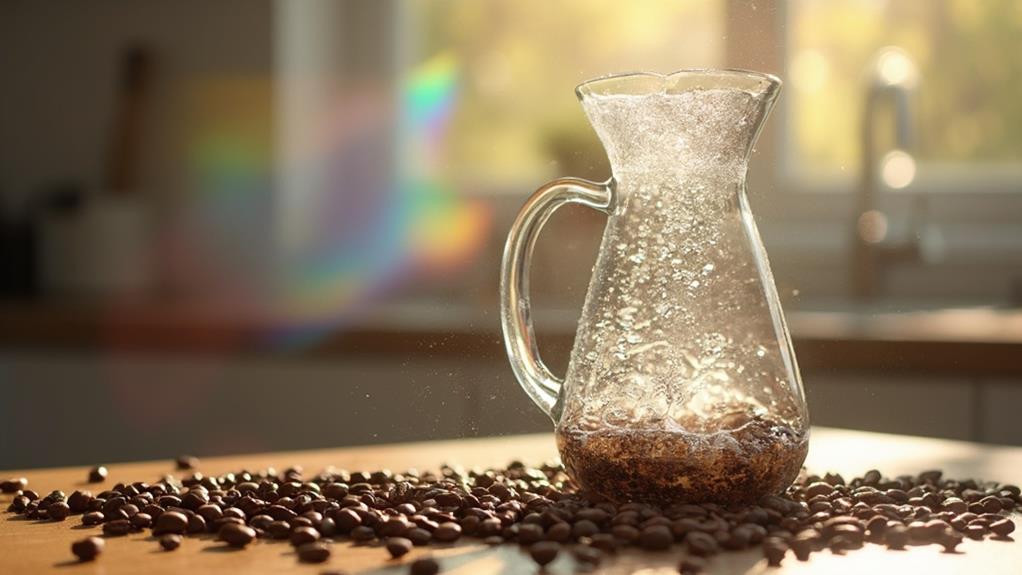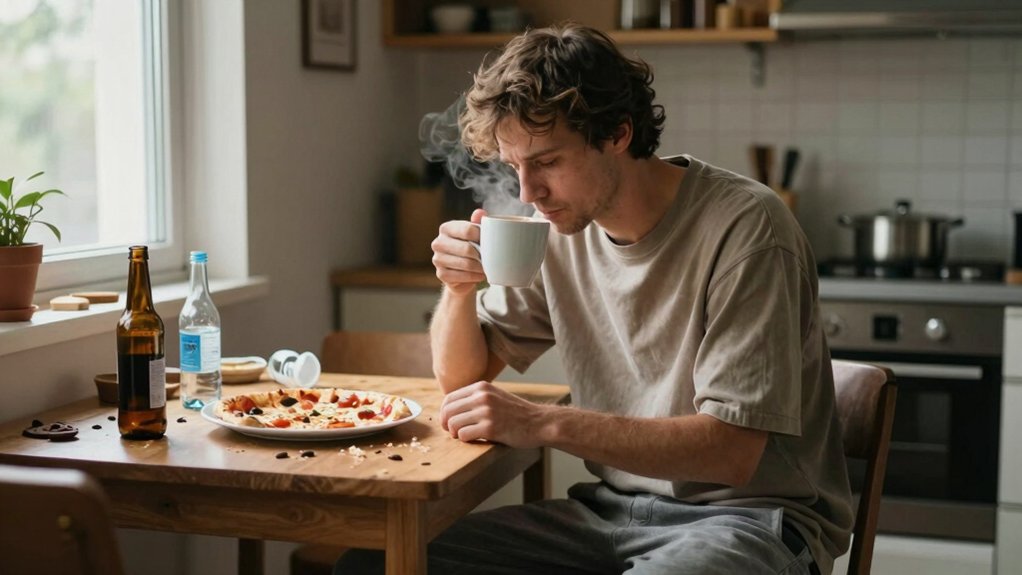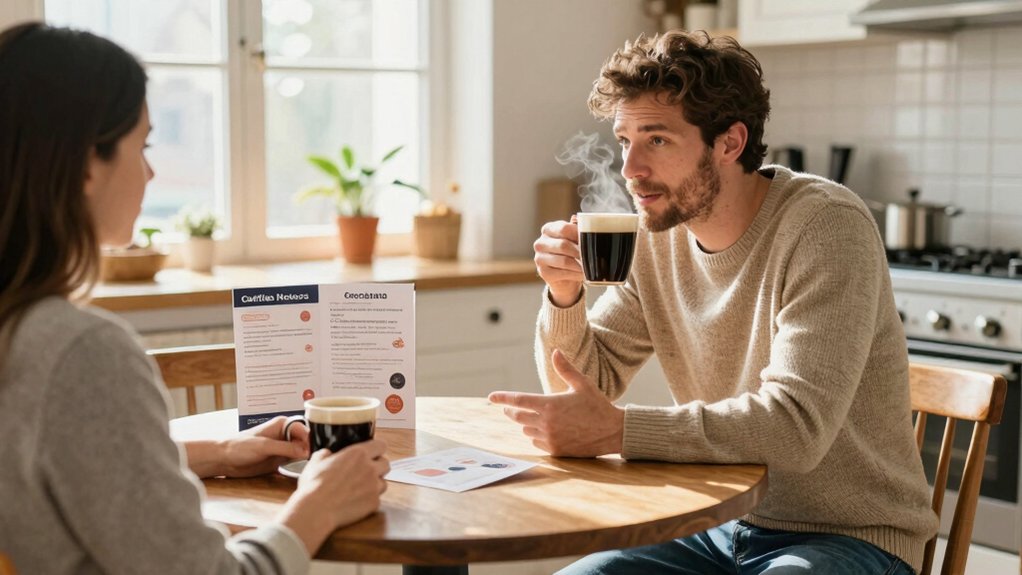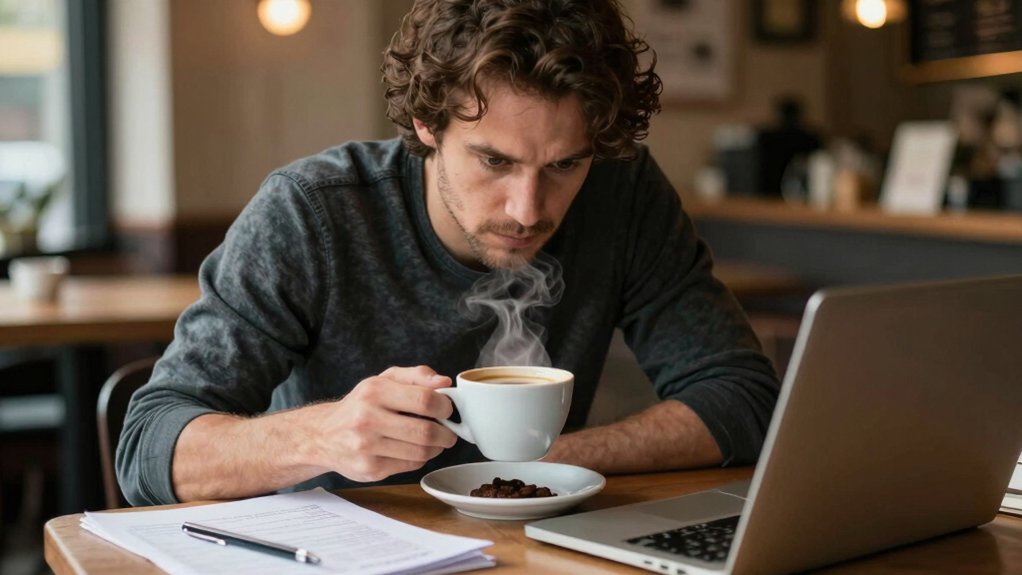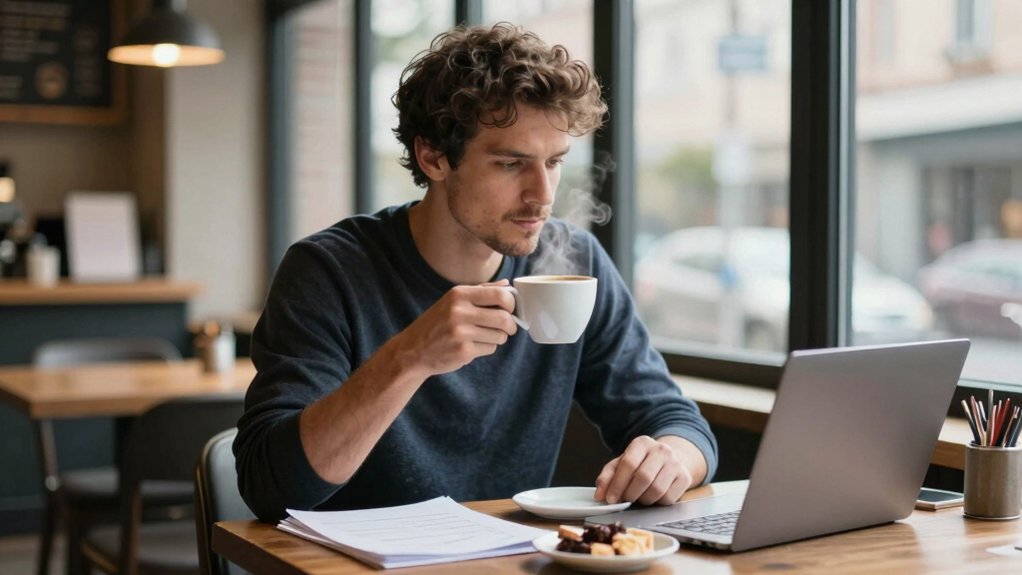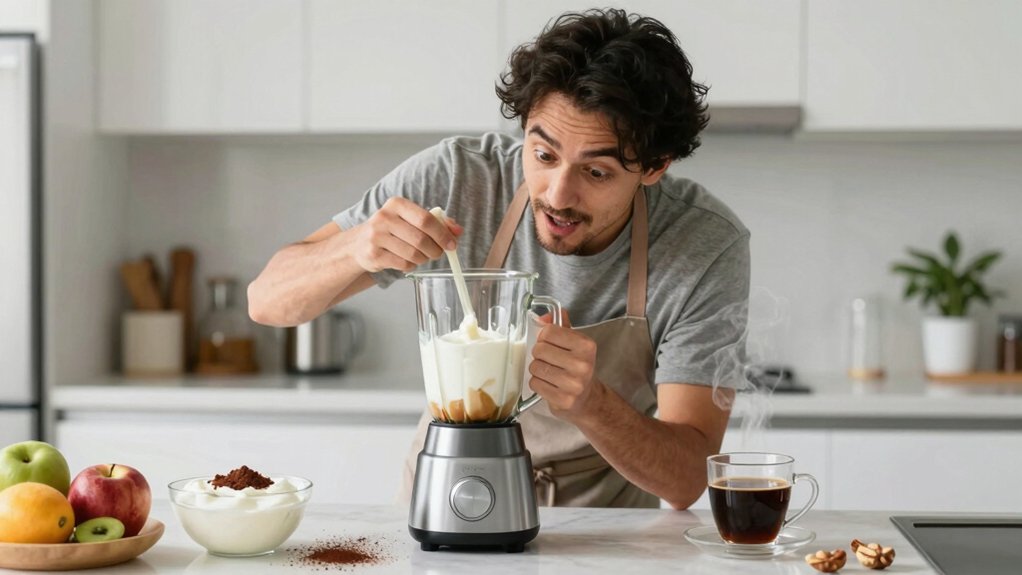I’ve always been fascinated by how something as simple as water can dramatically impact the taste of coffee. As a coffee enthusiast, I’ve learned that the secret to a perfect brew isn’t just about the beans or the method—it’s also about the water you use. The right water can enhance your coffee experience, bringing out subtle flavors and aromas you might’ve been missing. But what exactly makes water “right” for coffee? And how can you guarantee you’re using the best possible water for your daily cup? Let’s investigate this often-overlooked aspect of coffee brewing and uncover the key to revealing your coffee’s full potential.
Table of Contents
What Is the Best Water for Brewing Coffee?
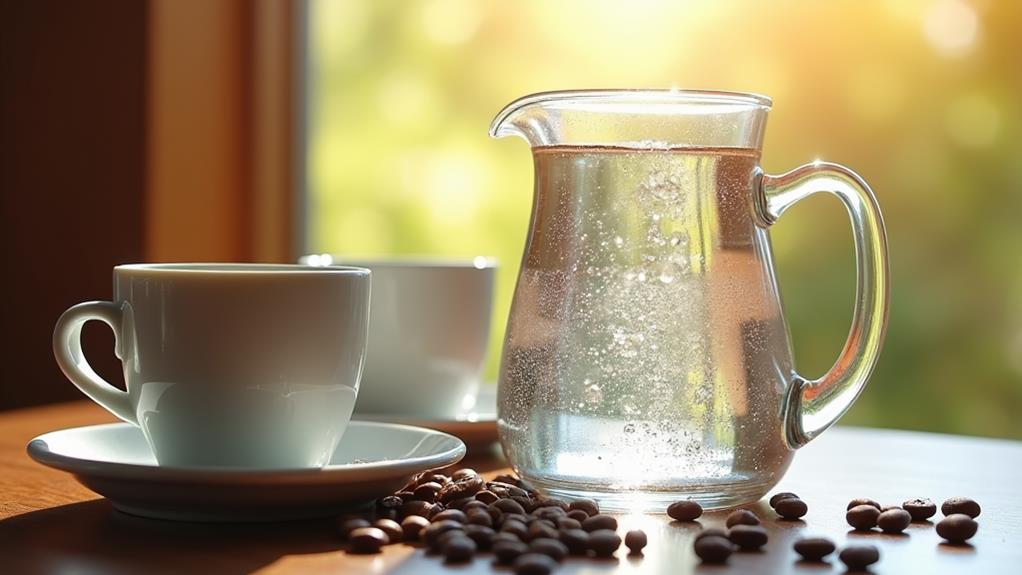
Let’s tackle the big question: what’s the best water for brewing your daily cup of joe?
I’ll break down the pros and cons of tap water, bottled water, and soft water to help you make the right choice for your coffee setup.
Understanding these options will get you one step closer to coffee perfection.
Tap Water
Tap water quality varies widely by location, affecting coffee flavor.
Ideal brewing water has 30-100 ppm TDS and a 2:1 hardness-to-alkalinity ratio. High calcium and bicarbonate levels can ruin taste.
Regular equipment maintenance prevents limescale buildup. Using a water filter pitcher or dedicated coffee filter system can improve tap water quality, removing impurities and adjusting mineral content for better-tasting coffee.
Bottled Water
Bottled water can greatly improve your coffee’s flavor.
Opt for brands like Volvic or Ashbeck with balanced mineral content and TDS levels around 150-200 ppm.
Avoid high-mineral waters like Evian or Gerolsteiner.
Look for pH levels between 6.5 and 7.5 for neutral flavor.
Some bottled waters are particularly designed for coffee brewing, featuring customized mineral blends to optimize extraction and taste.
Soft Water
Soft water is perfect for brewing coffee, with TDS levels between 30-100 ppm. It prevents mineral buildup in machines and improves flavor extraction.
A 2:1 hardness-to-alkalinity ratio guarantees a smooth taste profile. Soft water produces cleaner-tasting coffee by minimizing over-extraction and bitterness.
Regular testing is recommended to maintain the right mineral balance for ideal brewing results.
How Does Water Affect Coffee Taste?
Let’s talk about how water affects your coffee’s taste.
I’ll cover three key factors: mineral content, pH levels, and water temperature.
These elements play an essential role in extracting flavors from your coffee beans and can make or break your brew.
Mineral Content
Mineral content in water greatly impacts coffee taste.
Calcium and magnesium improve sweetness and complexity, with ideal concentrations around 150-200 ppm. A 2:1 hardness-to-alkalinity ratio promotes best extraction.
High bicarbonates can overpower flavors, while low minerals result in flat coffee. Aim for 30-100 ppm Total Dissolved Solids.
Regular testing and adjusting of water composition can help tailor coffee profiles to highlight bean characteristics.
pH Levels
Water pH greatly impacts coffee flavor. The ideal range is 6.5 to 7.5, with neutral pH around 7.0 preferred.
Too alkaline water results in flat taste, while overly acidic water produces sour notes. Chlorine and chloramines in tap water can ruin coffee’s flavor.
Regular pH testing guarantees ideal brewing conditions. Using the right water pH is essential for a balanced, flavorful cup of coffee.
Water Temperature
Water temperature is essential for coffee brewing. The ideal range is 195°F to 205°F, with 200°F being best.
Too hot, and you’ll get bitter over-extraction; too cool, and you’ll have weak under-extraction. Consistency is key for uniform flavor.
For espresso, aim for 195°F to 200°F. Let boiled water cool slightly before use to preserve oxygen content and improve flavor.
What Are the Types of Water to Avoid?

Let’s talk about the water types you’ll want to steer clear of for your perfect brew.
Distilled water and reverse osmosis water are big no-nos, as they lack the essential minerals that give your coffee its full flavor profile.
Softened water can also be problematic, often containing excess sodium that can throw off the taste balance.
Distilled Water
Distilled water is a no-go for coffee brewing. It lacks essential minerals like calcium and magnesium, resulting in flavorless coffee.
This pure water can actually leach minerals from coffee grounds, leading to a dull cup. Even high-pressure espresso extraction suffers, potentially causing over-extraction and unwanted bitterness.
For the best coffee experience, skip distilled water and opt for filtered or mineral-balanced alternatives instead.
Reverse Osmosis
Reverse osmosis water, while highly purified, lacks essential minerals vital for great coffee flavor.
Without re-mineralization, it’s not ideal for brewing.
Similarly, distilled water should be avoided due to its complete lack of minerals, resulting in flat-tasting coffee.
Overly hard bottled waters and tap water with high calcium and bicarbonate levels can also negatively impact taste and damage equipment.
Softened Water
Softened water isn’t ideal for coffee brewing.
While it removes scale-causing minerals, it often replaces them with sodium, which can negatively impact taste.
Softened water may also lack the essential minerals needed for proper extraction.
When brewing coffee, it’s best to avoid distilled, reverse osmosis, hard, overly alkaline, and untreated tap water for best flavor and equipment longevity.
How to Choose the Right Water for Coffee?
Let’s talk about choosing the right water for your coffee.
I’m going to break down three top options: filtered water, spring water, and specialty water products.
Each of these choices can notably improve your brew’s flavor, so let’s examine how to pick the best one for your needs.
Filtered Water
Filtered water is essential for great coffee. Aim for a TDS of 150 mg/L and pH between 6.5-7.5.
Choose filters like Brita or Ehm alkaline that remove impurities while retaining beneficial minerals. Regularly maintain and replace filters to avoid reintroducing contaminants.
Test your tap water quality periodically, especially in hard water areas. Proper filtration can greatly enhance your coffee’s taste.
Spring Water
When selecting spring water for coffee, look for balanced mineral content. Aim for calcium levels around 30-50 mg/L and magnesium between 5-15 mg/L.
Check for TDS levels between 30-100 ppm. Avoid high bicarbonate levels.
Brands like Volvic and Ashbeck are popular choices. Make certain the water is free from contaminants and chlorine.
These factors will help you brew coffee with the best flavor extraction.
Specialty Water Products
When selecting specialty water for coffee, aim for a TDS range of 30-100 ppm.
Pre-made mineral mixes like Third Wave Water offer convenience.
Consider balanced bottled waters like Volvic or Ashbeck.
Look for a 2:1 hardness-to-alkalinity ratio and a pH between 6.5 and 7.5.
These factors guarantee peak flavor extraction and equipment longevity while preserving the coffee’s natural notes.
Tips for Improving Your Coffee Brew
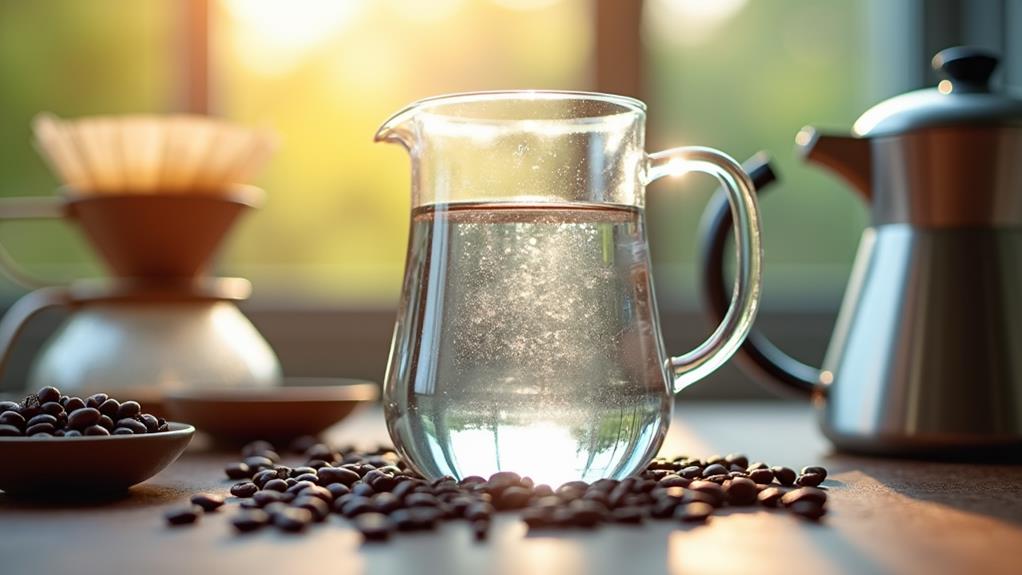
Let’s talk about improving your coffee brew with better water.
I’ll show you how to choose the right filtration system to remove contaminants that can ruin your coffee’s taste.
You’ll also learn about the ideal brewing water composition and how it affects your cup’s flavor profile.
Water Filtration Systems
Invest in a quality water filtration system like Brita or Ehm alkaline filter to improve your coffee’s taste.
For commercial-grade purification, consider reverse osmosis, but remember to remineralize afterward.
Replace filters regularly and use a TDS meter to maintain ideal water quality.
Third Wave Water mineral packets offer a convenient way to create the perfect water profile for brewing.
Brewing Water
Use filtered or bottled water with 30-100 ppm TDS for ideal coffee extraction.
Aim for a 2:1 hardness-to-alkalinity ratio.
For espresso, choose low mineral content water with 40-50 mg/L calcium.
Avoid distilled or reverse osmosis water alone; consider re-mineralizing.
Regularly test water quality, ensuring a pH of 6.5-7.5 and no chlorine.
These tips will considerably improve your coffee’s flavor and brewing process.
Contaminants from Water
Chlorine and chloramines in tap water can ruin coffee flavor.
Use carbon filtration to remove these impurities. Aim for water with 30-100 ppm total dissolved solids (TDS) for ideal taste.
Regularly test water quality to maintain consistency.
Consider using balanced bottled mineral water like Volvic or install a water filter system like Brita or Ehm alkaline to improve your brew’s flavor.
Frequently Asked Questions
What Is the Best Water to Use for Coffee?
I’d recommend using water with balanced mineral content, not too hard or soft. I aim for a neutral pH and moderate temperature. I prefer filtered or bottled water sources to guarantee the best flavor extraction for my coffee.
Is Filtered or Distilled Water Better for Coffee?
I’d recommend filtered water over distilled for your coffee. It retains essential minerals, enhancing flavor extraction. Distilled water’s lack of minerals can lead to flat taste. Consider your brewing method and water temperature for ideal results and a rich flavor profile.
What Water Does Starbucks Use for Coffee?
I can tell you that Starbucks uses filtered water for their coffee. They’ve got a fancy water filtration system that controls mineral content and water quality. They also maintain specific water temperatures during the brewing process for ideal flavor.
Should You Use Tap Water for Coffee?
I’d advise against using tap water for coffee. Its quality varies widely, affecting mineral content and taste. For ideal extraction, I recommend filtered water with balanced minerals. Consider your brewing method and water temperature to improve your coffee experience.
In Conclusion
I’ve found that using the right water can make or break your coffee. Aim for filtered water with a TDS between 30-100 ppm and a pH of 6.5-7.5. Avoid distilled or reverse osmosis water, as they’ll leave your brew flat. If you’re serious about upping your coffee game, invest in a good water filter or try bottled options like Volvic or Ashbeck. Remember, great coffee starts with great water. Happy brewing!
References:
- Specialty Coffee Association (SCA). “Water Quality Handbook.” https://sca.coffee/research/coffee-standards
- World Coffee Research. “Sensory Lexicon.” https://worldcoffeeresearch.org/work/sensory-lexicon/
- European Coffee Brewing Centre. “Water for Coffee Brewing.” https://www.ecbc.info/
- Maxwell Colonna-Dashwood and Christopher Hendon. “Water for Coffee.” 2015.
- National Coffee Association (NCA). “The Craft and Science of Coffee.” https://www.ncausa.org/
- Water Quality Association (WQA). “Water Treatment for Coffee Brewing.” https://www.wqa.org/
- James Hoffmann. “The World Atlas of Coffee: From Beans to Brewing – Coffees Investigated, Explained and Enjoyed.” 2018.
- Scott Rao. “The Coffee Roaster’s Companion.” 2014.
- International Specialty Coffee Association (SCA). “Water Quality Standards.” https://sca.coffee/research/protocols-best-practices
- American Water Works Association (AWWA). “Water Quality and Treatment: A Handbook on Drinking Water.” 2010.

